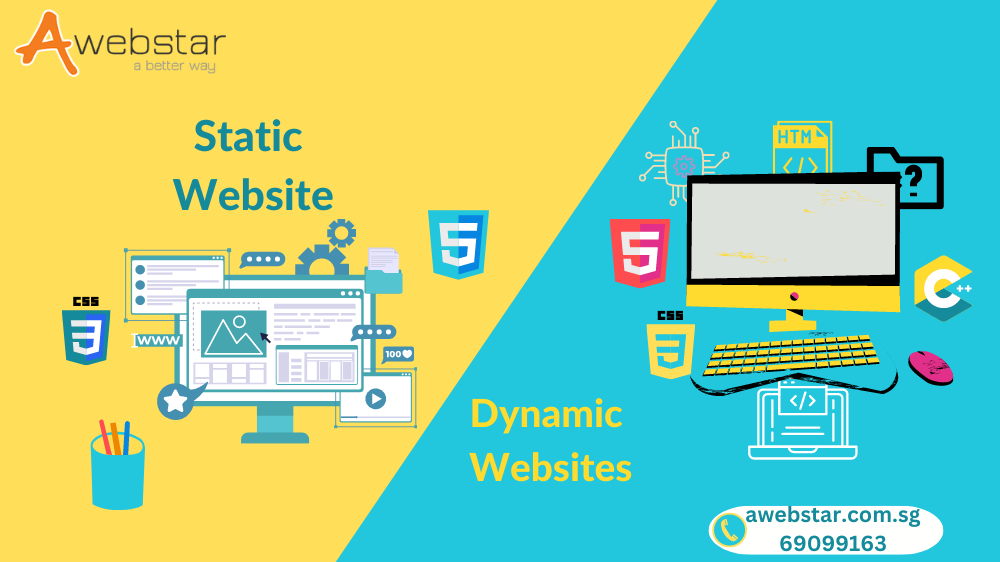
Nowadays there are plenty of websites built using themes, plugins, and features. But ‘static’ and ‘dynamic’ always mean different things, especially when it comes to Web Development for eCommerce businesses. However, both are same in the essence but still have their functionality and importance.
The two terms are used when a website is developed by different types of developers. Static sites have already been created and can be accessed through the web browser. These are easiest to create but can be hard to make visually appealing. Whereas dynamic sites are those which are being built dynamically or are being managed by a hosting company. These usually have more interactive content and can be a lot more fun to work with. The main difference between static and dynamic is that static websites do need not to go through server-side processing while dynamic pages can be modified whenever required.
But which one should you use? The answer is it depends on what you’re trying to accomplish with your website
Let us talk about what static and dynamic websites are in detail first. Afterwards, we will cover the advantage and disadvantages that differ from each other.
Let’s begin!!
Overview of a Static Website:
In a nutshell, a static website is an online landing page or a site that does not require any database for its search or maintenance. It means that any changes would need to be made manually in the files of the site.
The modifications are made to the homepage’s HTML files and the changed elements will be seen only on the homepage. One most vital characteristics of a static website are all the users have access to the same content. This is the reason why static websites are a good option for websites with lesser pages and require no frequent modifications.
What is a Dynamic Website?
A dynamic website responds to the needs of the visitor and can be accessed anytime, from any device with an internet connection. Static sites on the other hand are unable to do this. Again let me give you an example: If you enter an event in Google calendar on your computer, you will be able to access all of your events in Google calendar on your cell phone or tablet as well. These are dynamic websites where you add, edit, and delete events anytime you want and the database is synchronized for everyone else to see at the same time.
In simple terms, dynamic sites enable content delivery and display dynamically and as per user behaviour.
What Are The Advantages of Static Websites?
1. Quick Site Loading Speed:
The design of a static page has one main purpose: to improve site loading speed. Thus, enhancing the overall user’s browsing experience. The content published on the static sites is pre-written and sent to the server side. This results in easy caching and content taking less time to load. Also, no UX hassles occur like blur or broken images.
All in all, static sites require no client-server or database for functioning. They have a natural quick loading speed that positively influences the rankings. Isn’t it great!!
2. Guarantees Enhanced Security:
Static websites are less prone to cyberattacks or hacking. The reason is they are not connected to any database or designed with the use of third-party plugins or extensions. These are usually the sources of attacks. It is not like static websites do not experience cyber threats but are much safer than dynamic ones.
However, the enhanced security also depends on the sort of website builder you choose. Many of them offer SQL, SSL, and DDos like safety certificates, assuring additional protection layers to the site.
3. Easy to Build:
Static websites require fewer modifications which means creating and launching them quickly is much easier. They need no server connectivity and have pre-written content. The only time required may be to decide about each webpage design. However, don’t think dynamic website designing is a slow page. It is that static sites are much simpler and quicker to deploy.
Benefits of Dynamic Websites:
1. Easy-to-Update:
Running any business requires a website and a website needs continued changes to keep users informed about the latest trends. Luckily, the dynamic website lets you do this efficiently. It offers greater scalability as the number of pages is easily and quickly accessible.
Content modifications made on one page reflect throughout the website without compromising on design. As a result, a dynamic website is ideal for a wide range of web pages. It will ensure easy and efficient website maintenance.
2. Better Functionality:
Static pages are great in terms of interaction. However, dynamic pages assure enhanced functionality. They are limitless in terms of design and only restricted in the case of language or logic essential for creating a dynamic site.
Let us take the example of Amazon Prime. It is a quite complex and large dynamic site which works great, both in terms of enhancing user experience and functionality. It can deliver huge content to users with different geographical locations, and credentials, and offer recommendations depending on their previous browsing history.
3. Enhanced User Experience:
A dynamic website allows for providing tailored content to the users as per their preferences. Showcasing the data on the page is easy based on their locations or modifying the content according to their preferences or past behaviour. Isn’t it great!!
No matter, what the case is, you can easily customize the dynamic sites as per the user interactions and behaviours. Thus, improving their experience as a whole. The convenience of personalizing also makes the users return to the site. Therefore, increasing the conversion rate.
Conclusion:
To conclude, considering the static approach is great for small websites that require no personalization. On the other hand, dynamic website design is ideal where users expect a more personalized experience from browsing websites, especially eCommerce ones.
Choosing dynamic websites helps to increase your focus on the specific benefits offered to the users. It includes tailored content and more personalized site designs. We recommend seeking assistance from knowledgeable web experts of Awebstar, one of the best web design and development company in Singapore. They can help you decide which of these options will suit your business needs best. When working with site developers, consider telling them about your goals and the problems you are hoping to address. They can then create a customized solution that fulfils those goals while working within your budget.















































